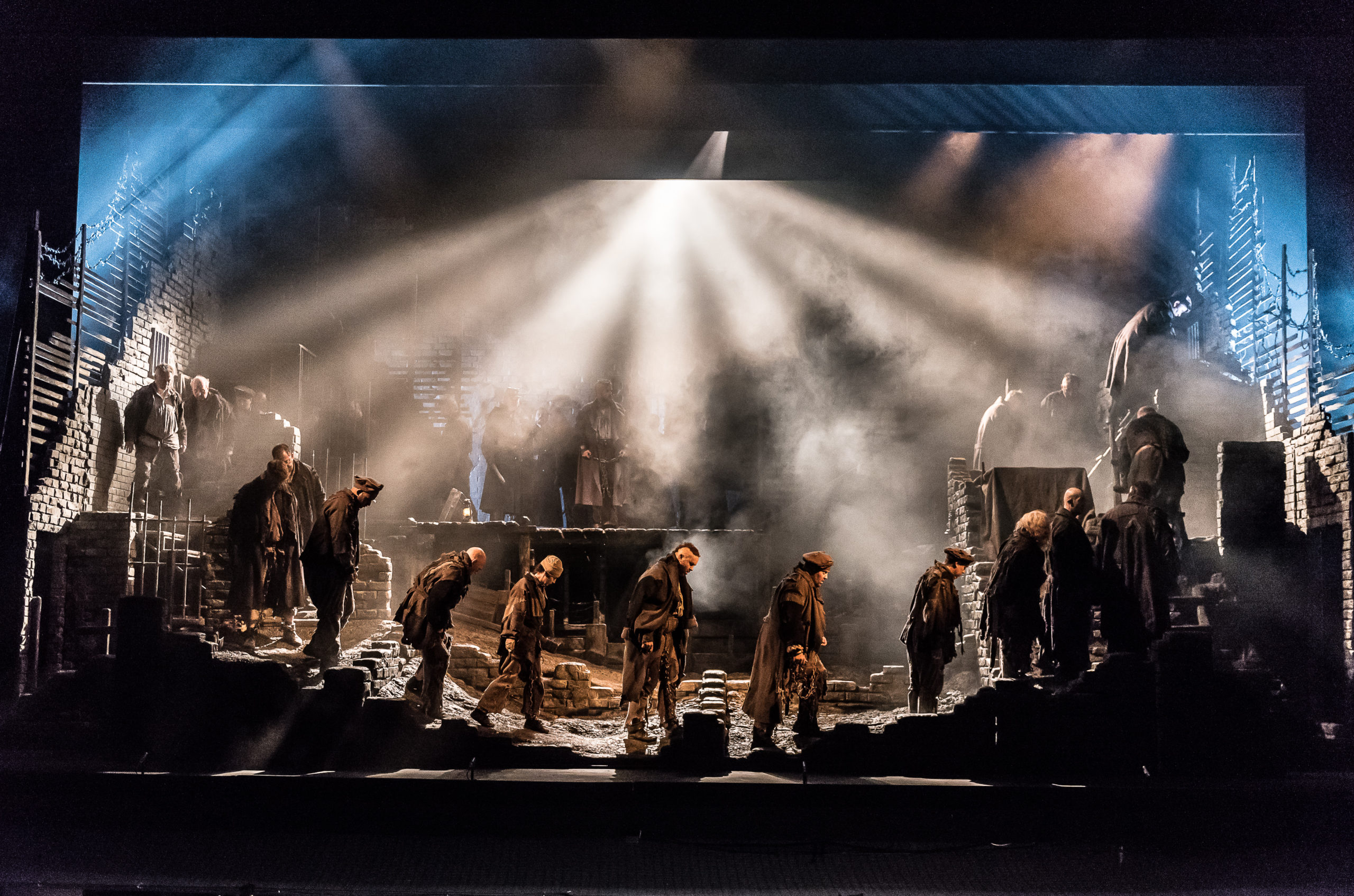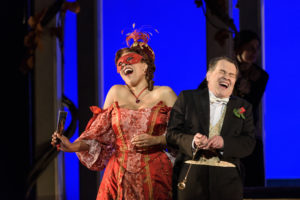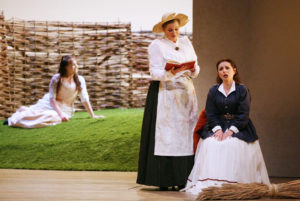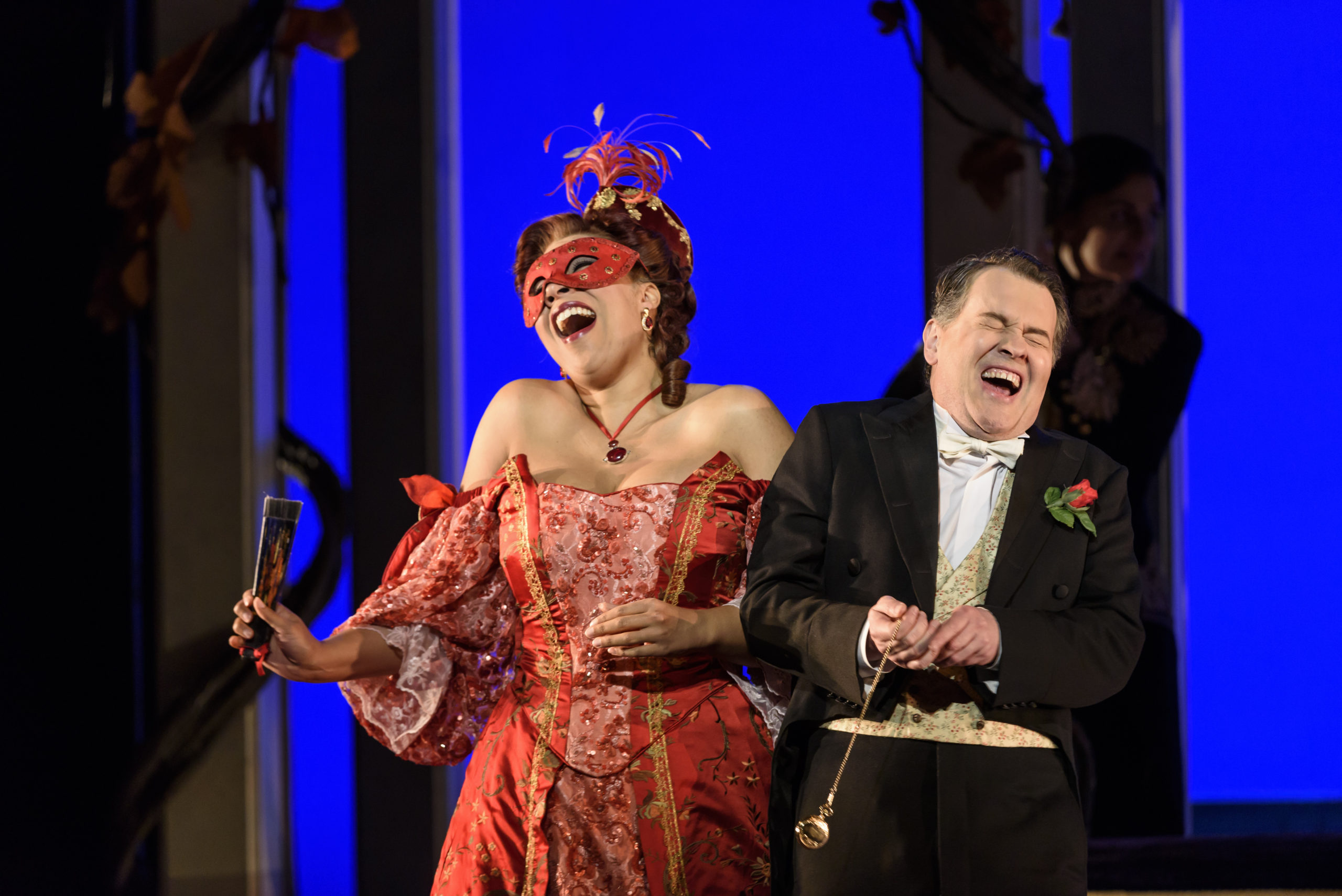 FROM THE HOUSE OF THE DEAD by Janacek
FROM THE HOUSE OF THE DEAD by Janacek
DIE FLEDERMAUS 17th & 18th November
Die Fledermaus takes us back in time to when it was good to be a wealthy man, when patting bottoms was considered to be a bit of a lark. When, for the moneyed classes enough champagne would open almost any (ahem) opportunity. In France, where this plot had its flowering, it was the beginning of La Belle Époch. Elsewhere in Europe such naughtiness was frowned upon – at least in public and the story has been mucked around with to suit national taste and acceptability. An original German story was sexed up by France only to be subsequently sanitized for less liberated audiences. Jolly stereotypes abound: a singing Italian, Alfred (Paul Charles Clarke) a homesick Hungarian played in disguise by Rosalinde (Judith Howarth) a cheeky, peart maid, Adele (Rhian Lois), a numbskull lawyer – looking strangely like Billy Bunter – (Joe Roche) and a jaded prince.
 Director John Copley has unashamedly squeezed the comedy from the WNO’s translation and garnished with some additional dialogue. In the grand ball scene of act II the male chorus are literally falling over themselves for a glimpse of ankle and little music-hall dances are scattered throughout. Eisenstein and Falke kick things off as they excitedly anticipate the forbidden delights of Orlofsky’s ball with a little comic dance. Mr Clarke’s irrepressible Italian lover could have been in a play ‘wot Ernie Wise had wrote’ and is twice the fun for that.
Director John Copley has unashamedly squeezed the comedy from the WNO’s translation and garnished with some additional dialogue. In the grand ball scene of act II the male chorus are literally falling over themselves for a glimpse of ankle and little music-hall dances are scattered throughout. Eisenstein and Falke kick things off as they excitedly anticipate the forbidden delights of Orlofsky’s ball with a little comic dance. Mr Clarke’s irrepressible Italian lover could have been in a play ‘wot Ernie Wise had wrote’ and is twice the fun for that.
Prince Orlofsky (Anna Harvey) happily keeps ‘boredom’ to a minimum and gives a fresh youthful swagger to the traditional ‘trouser role’, which she backs up with some crisp singing. In Miss Howarth we have a soprano of authority and a Rosalinde of charm, backbone and guile. Her husband, Eisenstein (Mark Stone) a man out to enjoy the life afforded by his position and wealth, is too boyishly enthusiastic about his amatory prospects to be classed as a cad and has the saving grace (at least for contemporary audiences) that he tries to seduce his own wife not knowing it is in fact she.
Steve Spiers as the jailer, an earthy outsider, comes on for some music-hall light relief, bantering with the audience, the band and conductor, making the point, if we hadn’t got it already, that this is an entertainment, an operetta so light that if it weren’t for a certain ballast in Mr Spiers – the subject of his own patter – it might well have floated away into the distance. Act three is as much panto as operetta and bravo to the WNO for going with the flow, recognising the absurdity of the plot and making a virtue of it.
For this production the WNO have taken out the first seven rows of the stalls to accommodate the orchestra and the lush sound of the Strauss score is the beneficiary. With orchestra, under James Southall, and chorus at full tilt it is an unforgettable, spine tingling experience.
With a potential alternative title of ‘Blame it on the Champagne’, and a willingness to laugh at itself, this production fizzes with joy. ★★★★☆ Graham Wyles 18th November 2017
FROM THE HOUSE OF THE DEAD 16th November
There is sun-bright brass, and thundering timpani, and the curtain rises on a scene of desolation…
From The House Of The Dead is a 90-minute opera based upon Dostoyevsky’s account of life in a Siberian prison camp. Janáček’s extraordinary score was very near completion when he died in 1928, but others then tampered with it, largely by thickening the orchestration. In the WNO’s programme notes John Tyrrell explains how over a period of many years he has painstakingly chipped away at these accretions to reveal the composer’s original intentions, heard for the very first time in this production. His time was well spent. From the very first notes of the overture we are taken into Janáček’s highly individual sound world, full of strange harmonies and rhythmic inventiveness, all shot through with echoes of Czech folk music. It’s wonderful stuff, played quite brilliantly by the WNO orchestra under Czech Music Director Tomáš Hanus, who is very much at home with this material.
Maria Bjőrnson has created a virtually monochrome set of fractured brickwork and dark chambers, the winter sun filtering in through a barred window. Dressed in rags, the prisoners are in motionless sleep, barely distinguishable from the broken ground they lie on. There are noises off, and they wake. A political prisoner called Goryanchikov (Ben McAteer) is to be brought in. This is a noteworthy event – ‘a noble man!’ they cry. When he is dragged in, his smart city clothes mark him out as someone from another world, but he is quickly stripped of them, for they can be sold. McAteer conveys vividly the sense that Goryanchikov is a civilised man who finds himself in hell. Goryanchikov is surely Dostoyevsky himself, who spent four years in a camp such as this.
Violence is all-pervading. Two prisoners quarrel, until their fight is broken up by the commanding figure of Luka Kuzmich, who then sings movingly about the flogging he was given for killing a hated guard. Mark Le Brocq is excellent as Luka, vividly recalling both his own savagery and that of his punishment. Goryanchikov too, is beaten, the other prisoners flinching in sympathy with each blow. A moment such as that reveals the humanity of these wretched, brutalised men; Janáček wanted to show that ‘in every creature there is the spark of God.’ That spark is also revealed in the prisoners’ admiration for an injured eagle that they keep in a cage. They recognise that it embodies a perfection that lies well beyond their reach: ‘He’s a bird; we are only people.’
The House Of The Dead has no plot in the ordinary sense of the word. Instead, we are given brief portraits of some of these prisoners as they tell stories about their crimes and punishments. These stories, all brilliantly delivered, have jagged, angular vocal lines that just occasionally allow glimpses of lyricism to shine through. Skuratov (Alan Oke) describes how he once met a pretty German girl, Luisa, and how he had hoped to marry her. At first, Skuratov seems to be telling a winsome tale of youthful romance, but there is an edge to Oke’s singing, and a tension in his gestures that make it clear that this story will not end well.
The prisoners are shameless in their recollections of past crimes, revealing a kind of grotesque, twisted moral sense. One of them, Shishkov (Simon Bailey), tells a convoluted story about Akulka, a girl publicly dishonoured by his rival Filka, who claimed he had bedded her. Shishkov at first condemned Akulka for losing her virginity, but was then persuaded that she was the innocent victim of a slander, so he married her. Shishkov had been duped, so he slit Akulka’s throat. Bailey delivers this story with relish, re-enacting its violent conclusion with chilling glee.
There is a break from grim reality when the prisoners have great fun performing two plays in mime. In one of them we see Don Juan dragged down into hell, a fate surely not dissimilar to that of the prisoners themselves. The other is The Lovely Miller’s Wife, a folk tale reminiscent of Chaucer at his bawdiest. The cast perform these plays with great gusto, accompanied by music of tremendous drive.
This is not by any means a conventional opera. Its subject matter is challenging, to say the least. But Janáček invests with a kind of stark beauty, the kind found in bleak, desolate landscapes. Near the end, Goryanchikov is released, and so is the eagle, its wounds now healed. The prisoners gather to sing a hymn in praise of this Tsar of the air, as it flies to freedom. It is a spine-tingling moment that will linger long in my memory. But their exultation cannot last; with shackles clanking they trudge off back to another day of hard labour.
From The House Of The Dead is sung superbly by all the soloists and by the chorus, but the WNO orchestra deserves the greatest praise. Bravo! ★★★★★ Mike Whitton 17th November 2017
EUGENE ONEGIN 15th November
Tchaikovsky’s Eugene Onegin features very little of the sophisticated satire that so characterises Pushkin’s original verse-novel. Instead, it is a straightforward romantic work that he believed should be performed with ‘the greatest possible simplicity and sincerity’. Originally directed by James Macdonald, and now overseen by revival director Caroline Chaney, WNO’s very fine Eugene Onegin has the directness the composer wished for. It is spare, uncluttered and entirely gimmick-free, and any temptation to relocate the setting or to update the plot has been wisely resisted.
 On a remote country estate we meet Olga and her younger sister Tatyana (Natalya Romaniw). They have visitors: Lensky, a young poet engaged to Olga, and Onegin (Nicholas Lester), his best friend. Tatyana is a romantic dreamer, lost in the fantasy world of her favourite novels, and instantly falls in love with the bored and aloof Onegin. In this production he is dressed stiffly from head to foot in sombre black, and Lester portrays him as a very cold fish indeed. He is so forbidding a figure that it is hard to see what Tatyana sees in him. Lensky (Jason Bridges) seems to be a far more colourful and attractive personality, deeply in love with the vivacious Olga. In the great ‘letter aria’ Romaniw is utterly convincing as an impulsive young girl swept away by emotions that she can neither control nor keep private. She has an endearing, childlike vulnerability. Inevitably, Tatyana is crushed by Onegin’s rejection, and humiliated when he lectures her on the need for emotional restraint.
On a remote country estate we meet Olga and her younger sister Tatyana (Natalya Romaniw). They have visitors: Lensky, a young poet engaged to Olga, and Onegin (Nicholas Lester), his best friend. Tatyana is a romantic dreamer, lost in the fantasy world of her favourite novels, and instantly falls in love with the bored and aloof Onegin. In this production he is dressed stiffly from head to foot in sombre black, and Lester portrays him as a very cold fish indeed. He is so forbidding a figure that it is hard to see what Tatyana sees in him. Lensky (Jason Bridges) seems to be a far more colourful and attractive personality, deeply in love with the vivacious Olga. In the great ‘letter aria’ Romaniw is utterly convincing as an impulsive young girl swept away by emotions that she can neither control nor keep private. She has an endearing, childlike vulnerability. Inevitably, Tatyana is crushed by Onegin’s rejection, and humiliated when he lectures her on the need for emotional restraint.
At the ball given in honour of Tatyana’s name day there is a moment of comedy when the brightly dressed poet Monsier Triquet (Joe Roche) sings Tatyana’s praises, with many a self-important, overblown flourish. His cheerfully flamboyant behaviour contrasts with that of the darkly brooding Onegin, who quarrels needlessly with Lensky. This scene is beautifully choreographed, with the merriment of the dancers turning to bewilderment as they become aware of the rising anger the hot-tempered young men. A duel ensues.
Jason Bridges is a deeply touching Lensky, portraying him as a rather Keatsian figure, half in love with death. He sings passionately of his feelings for Olga, but is content to accept whatever fate may bring. The two friends aim their pistols at each other; there is a shot, and Lensky falls dead.
Five years have passed, and we see a transformed Onegin. If Nicholas Lester was a little less than compelling as the object of the young Tatyana’s affections, he now gives an entirely convincing and moving depiction of a man ‘worn out by leisure’, who can find no solace in all his world-wide wanderings. We see him at a grand St Petersburg ball, a solitary figure reflecting on the meaninglessness of his existence and the loss of his dear friend Lensky. He sees Tatyana enters the ballroom on the arm of her husband, an aristocrat and war hero. Struck by her beauty, Onegin realises that he loves her. She too is overcome with emotion when she sees him. They arrange to meet, and in a tremendous, passionate duet it is clear that all her old feelings for him have been rekindled. We see glimpses of the reckless, impulsive girl she once was, but she has changed, and will remain a faithful wife. This final scene is heavy with irony; it is now Tatyana who lectures the impassioned Onegin on the need to keep dangerous emotions under wraps. She leaves him forever alone and in despair.
Conductor Ainārs Rubiķis and the WNO orchestra are entirely at home with Tchaikovsky’s lush, melodic score, and the WNO chorus sing gloriously and dance with considerable elan. Initially, I found Tobias Hoheisel’s starkly geometric set design very striking, but I had become a rather weary of its great blank surfaces well before the final act. But that is a minor quibble, for this is a splendid Eugene Onegin, with excellent singing in all the major roles. But it is Natalya’s Romaniw’s captivating performance as Tatyana that will live longest in my memory. ★★★★☆ Mike Whitton 16th November 2017


